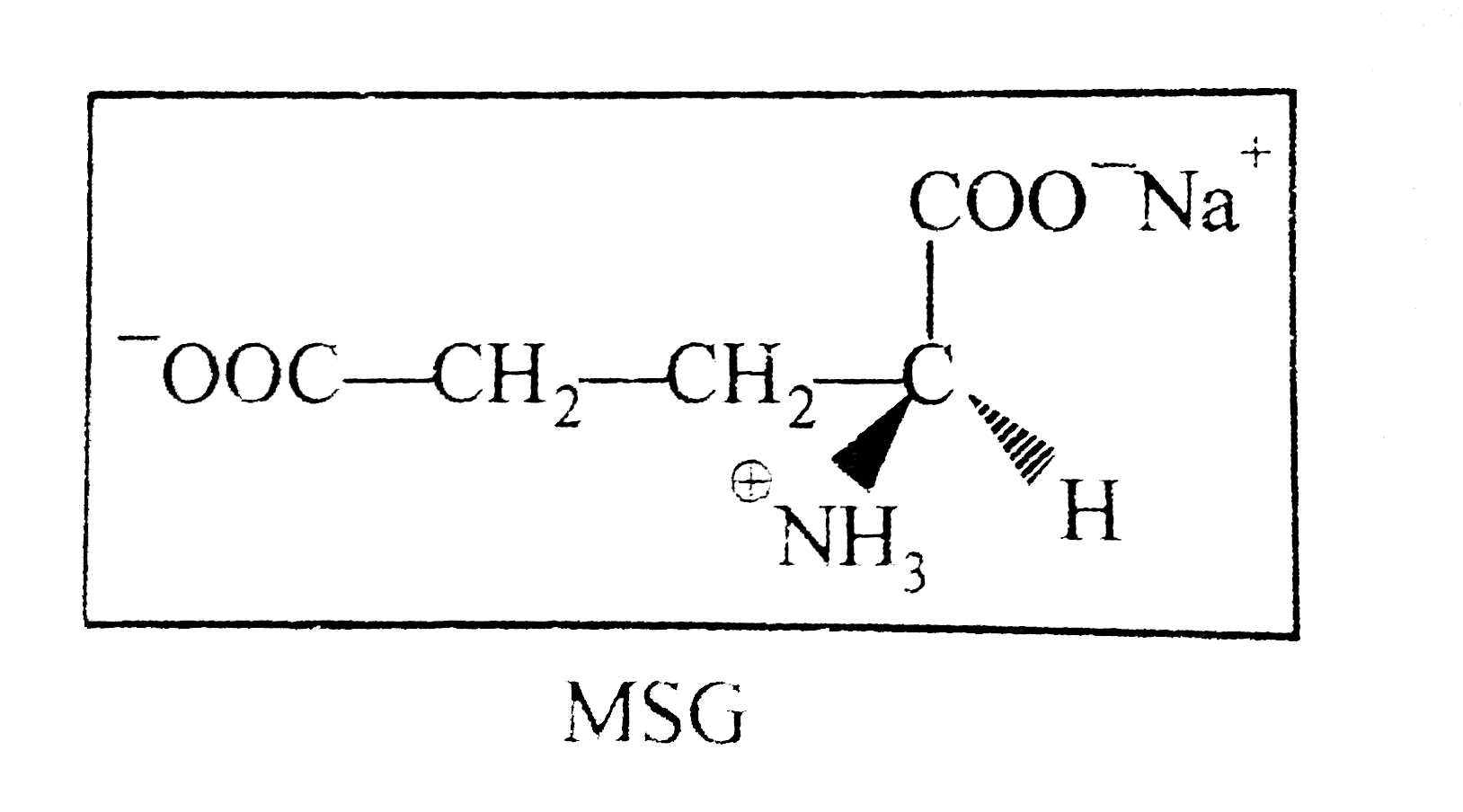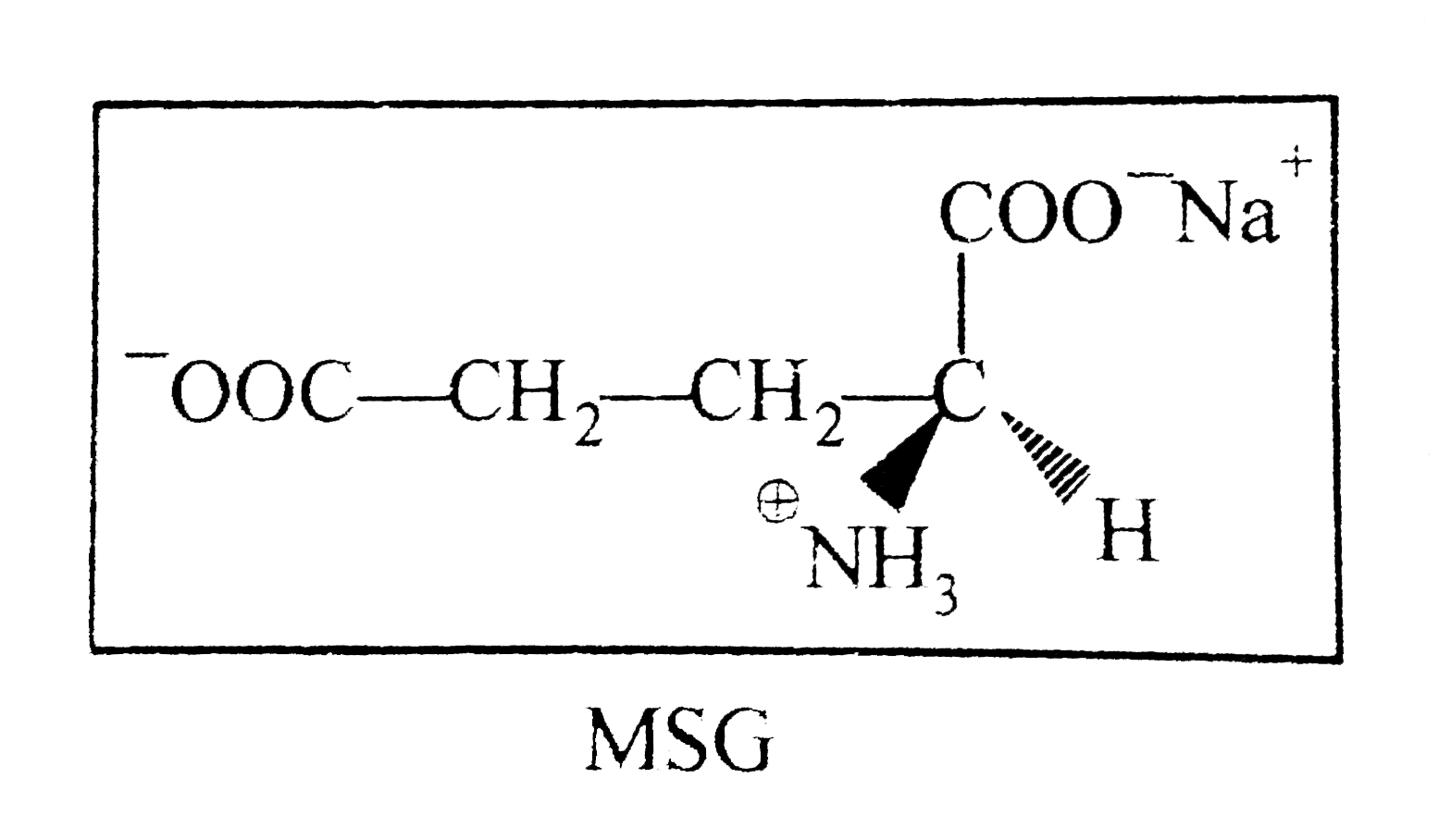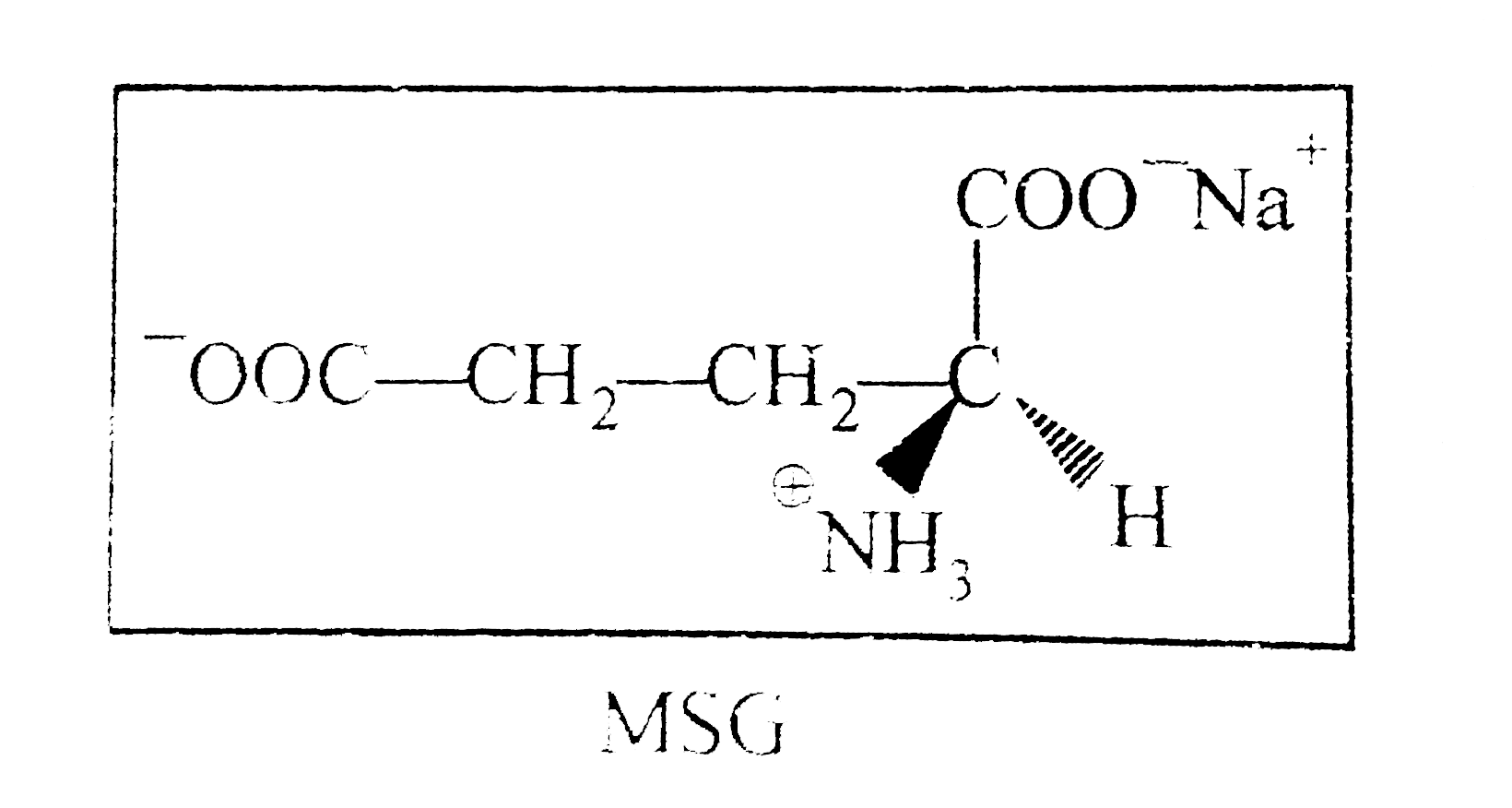S(+) Mono Sodium Glutamate (MSG) is a flavour enhancer used in many foods. Fast foods often contain substantial amount of MSG and is widely used in Chines food. If one mole of above MSG was placed in 845 ml solution and passed through 200 mm tube, the observed rotation was found to be +9.6∘.

Find out of the specific rotation of (-) MSG :
+24∘
+56.8∘
−48∘
none of these
The correct Answer is:D
[Specific rotation of (-) MSG
C=169gm845mll=2m
[θ∘]=θCl=9.6169/845×2=[−24∘]
Topper's Solved these Questions
Similar Questions
Greek yogurt—a strained form of cultured yogurt—has grown enormously in popularity in the United States since it was first introduced in the country in the late 1980s.
From 2011 to 2012 alone, sales of Greek yogurt in the US increased by 50 percent. The resulting increase in Greek yogurt production has forced those involved in the business to address the detrimental effects that the yogurt-making process may be having on the environment. Fortunately, farmers and others in the Greek yogurt business have found many methods of controlling and eliminating most environmental threats. Given these solutions as well as the many health benefits of the food, the advantages of Greek yogurt 1 outdo––––––– the potential drawbacks of its production.
[1] The main environmental problem caused by the production of Greek yogurt is the reation of acid whey as a by-product. [2] Because it requires up to four times more milk to make than conventional yogurt does, Greek yogurt produces larger amounts of acid whey, which is difficult to dispose of. [3] To address the problem of disposal, farmers have found a number of uses for acid whey. [4] They can add it to livestock feed as a protein (2) supplement, and people can make their own Greek-style yogurt at home by straining regular yogurt–––––––––––––––––––––––––––––––––––––––––––––––––––––––––––––––––––––––––––––––––––––––––––––––––––––––––––. [5] If it is improperly introduced into the environment, acid-whey runoff (3) can pollute waterways––––––––––––––––––––––––, depleting the oxygen content of streams and rivers as it decomposes. [6] Yogurt manufacturers, food (4)scientists, and––––––––––––––––government officials are also working together to develop additional solutions for reusing whey.(5).
(6) Though these conservation methods can be costly and time-consuming, they are well worth the effort–––––––––––––––––––––––––––––––––––––––––––––––––––––––––––––––––––––––––––––––––––––––––––––––––––––––––––––.Nutritionists consider Greek yogurt to be a healthy food: it is an excellent source of calcium and protein, serves (7) to be––––––– a digestive aid, and 8 'ul("it contains")fewcalories∈itsunsweete≠dlow−andnon−fatforms.Greekyogurtisslightlylower∈sugarandcarbohydratesthanconventionalyogurtis.(9)ul("Also"),∵itismoreconcentrated,Greekyogurtconta∈sslightlymoreprote∈perserv∈g,therebyhelπngpeop≤stay(10)ul("satiated")forlon≥rperiodsoftime.Thesehea<hbe≠fitshavepromptedGreekyogurt’srecentsur≥∈popa––rity.Infact,Greekyogurtcanbefound∈an∈creasingνmberof∏uctssuchassnackf∞dandozendesserts.Becausecon∑ersreaptheνtritionalbe≠fitsofGreekyogurtand⊃portthosewhomakeandsell(11)ul("it, therefore farmers") and businesses should continue finding safe and effective methods of producing the food.
View SolutionGreek yogurt—a strained form of cultured yogurt—has grown enormously in popularity in the United States since it was first introduced in the country in the late 1980s.
From 2011 to 2012 alone, sales of Greek yogurt in the US increased by 50 percent. The resulting increase in Greek yogurt production has forced those involved in the business to address the detrimental effects that the yogurt-making process may be having on the environment. Fortunately, farmers and others in the Greek yogurt business have found many methods of controlling and eliminating most environmental threats. Given these solutions as well as the many health benefits of the food, the advantages of Greek yogurt 1 outdo––––––– the potential drawbacks of its production.
[1] The main environmental problem caused by the production of Greek yogurt is the reation of acid whey as a by-product. [2] Because it requires up to four times more milk to make than conventional yogurt does, Greek yogurt produces larger amounts of acid whey, which is difficult to dispose of. [3] To address the problem of disposal, farmers have found a number of uses for acid whey. [4] They can add it to livestock feed as a protein (2) supplement, and people can make their own Greek-style yogurt at home by straining regular yogurt–––––––––––––––––––––––––––––––––––––––––––––––––––––––––––––––––––––––––––––––––––––––––––––––––––––––––––. [5] If it is improperly introduced into the environment, acid-whey runoff (3) can pollute waterways––––––––––––––––––––––––, depleting the oxygen content of streams and rivers as it decomposes. [6] Yogurt manufacturers, food (4)scientists, and––––––––––––––––government officials are also working together to develop additional solutions for reusing whey.(5).
(6) Though these conservation methods can be costly and time-consuming, they are well worth the effort–––––––––––––––––––––––––––––––––––––––––––––––––––––––––––––––––––––––––––––––––––––––––––––––––––––––––––––.Nutritionists consider Greek yogurt to be a healthy food: it is an excellent source of calcium and protein, serves (7) to be––––––– a digestive aid, and 8 'ul("it contains")fewcalories∈itsunsweete≠dlow−andnon−fatforms.Greekyogurtisslightlylower∈sugarandcarbohydratesthanconventionalyogurtis.(9)ul("Also"),∵itismoreconcentrated,Greekyogurtconta∈sslightlymoreprote∈perserv∈g,therebyhelπngpeop≤stay(10)ul("satiated")forlon≥rperiodsoftime.Thesehea<hbe≠fitshavepromptedGreekyogurt’srecentsur≥∈popa––rity.Infact,Greekyogurtcanbefound∈an∈creasingνmberof∏uctssuchassnackf∞dandozendesserts.Becausecon∑ersreaptheνtritionalbe≠fitsofGreekyogurtand⊃portthosewhomakeandsell(11)ul("it, therefore farmers") and businesses should continue finding safe and effective methods of producing the food.
View Solution
Knowledge Check
S(+) Mono Sodium Glutamate (MSG) is a flavour enhancer used in many foods. Fast foods often contain substantial amount of MSG and is widely used in Chines food. If one mole of above MSG was placed in 845 ml solution and passed through 200 mm tube, the observed rotation was found to be +9.6∘.

Find out the approximate percentage composition of (-) MSG in a mixture containing (+) MSG and (-) MSG whose specific optical rotation is −20∘A0.833B0.167C0.916D0.74S(+) Mono Sodium Glutamate (MSG) is a flavour enhancer used in many foods. Fast foods often contain substantial amount of MSG and is widely used in Chines food. If one mole of above MSG was placed in 845 ml solution and passed through 200 mm tube, the observed rotation was found to be +9.6∘.

If 33.8g of (+) MSG was put in 338 ml solution and was mixed with 16.9 g of (-) MSG put in 169 ml solution and the final solution was passed through 400 mm tube. find out observed rotation of these final solution.A+1.6∘B+4.8∘C+3.2∘Dnone of theseGreek yogurt—a strained form of cultured yogurt—has grown enormously in popularity in the United States since it was first introduced in the country in the late 1980s.
From 2011 to 2012 alone, sales of Greek yogurt in the US increased by 50 percent. The resulting increase in Greek yogurt production has forced those involved in the business to address the detrimental effects that the yogurt-making process may be having on the environment. Fortunately, farmers and others in the Greek yogurt business have found many methods of controlling and eliminating most environmental threats. Given these solutions as well as the many health benefits of the food, the advantages of Greek yogurt 1 outdo––––––– the potential drawbacks of its production.
[1] The main environmental problem caused by the production of Greek yogurt is the reation of acid whey as a by-product. [2] Because it requires up to four times more milk to make than conventional yogurt does, Greek yogurt produces larger amounts of acid whey, which is difficult to dispose of. [3] To address the problem of disposal, farmers have found a number of uses for acid whey. [4] They can add it to livestock feed as a protein (2) supplement, and people can make their own Greek-style yogurt at home by straining regular yogurt–––––––––––––––––––––––––––––––––––––––––––––––––––––––––––––––––––––––––––––––––––––––––––––––––––––––––––. [5] If it is improperly introduced into the environment, acid-whey runoff (3) can pollute waterways––––––––––––––––––––––––, depleting the oxygen content of streams and rivers as it decomposes. [6] Yogurt manufacturers, food (4)scientists, and––––––––––––––––government officials are also working together to develop additional solutions for reusing whey.(5).
(6) Though these conservation methods can be costly and time-consuming, they are well worth the effort–––––––––––––––––––––––––––––––––––––––––––––––––––––––––––––––––––––––––––––––––––––––––––––––––––––––––––––.Nutritionists consider Greek yogurt to be a healthy food: it is an excellent source of calcium and protein, serves (7) to be––––––– a digestive aid, and 8 'ul("it contains")fewcalories∈itsunsweete≠dlow−andnon−fatforms.Greekyogurtisslightlylower∈sugarandcarbohydratesthanconventionalyogurtis.(9)ul("Also"),∵itismoreconcentrated,Greekyogurtconta∈sslightlymoreprote∈perserv∈g,therebyhelπngpeop≤stay(10)ul("satiated")forlon≥rperiodsoftime.Thesehea<hbe≠fitshavepromptedGreekyogurt’srecentsur≥∈popa––rity.Infact,Greekyogurtcanbefound∈an∈creasingνmberof∏uctssuchassnackf∞dandozendesserts.Becausecon∑ersreaptheνtritionalbe≠fitsofGreekyogurtand⊃portthosewhomakeandsell(11)ul("it, therefore farmers") and businesses should continue finding safe and effective methods of producing the food.ANO CHANGEBdefeatCoutperformDoutweigh
Greek yogurt—a strained form of cultured yogurt—has grown enormously in popularity in the United States since it was first introduced in the country in the late 1980s.
From 2011 to 2012 alone, sales of Greek yogurt in the US increased by 50 percent. The resulting increase in Greek yogurt production has forced those involved in the business to address the detrimental effects that the yogurt-making process may be having on the environment. Fortunately, farmers and others in the Greek yogurt business have found many methods of controlling and eliminating most environmental threats. Given these solutions as well as the many health benefits of the food, the advantages of Greek yogurt 1 outdo––––––– the potential drawbacks of its production.
[1] The main environmental problem caused by the production of Greek yogurt is the reation of acid whey as a by-product. [2] Because it requires up to four times more milk to make than conventional yogurt does, Greek yogurt produces larger amounts of acid whey, which is difficult to dispose of. [3] To address the problem of disposal, farmers have found a number of uses for acid whey. [4] They can add it to livestock feed as a protein (2) supplement, and people can make their own Greek-style yogurt at home by straining regular yogurt–––––––––––––––––––––––––––––––––––––––––––––––––––––––––––––––––––––––––––––––––––––––––––––––––––––––––––. [5] If it is improperly introduced into the environment, acid-whey runoff (3) can pollute waterways––––––––––––––––––––––––, depleting the oxygen content of streams and rivers as it decomposes. [6] Yogurt manufacturers, food (4)scientists, and––––––––––––––––government officials are also working together to develop additional solutions for reusing whey.(5).
(6) Though these conservation methods can be costly and time-consuming, they are well worth the effort–––––––––––––––––––––––––––––––––––––––––––––––––––––––––––––––––––––––––––––––––––––––––––––––––––––––––––––.Nutritionists consider Greek yogurt to be a healthy food: it is an excellent source of calcium and protein, serves (7) to be––––––– a digestive aid, and 8 'ul("it contains")fewcalories∈itsunsweete≠dlow−andnon−fatforms.Greekyogurtisslightlylower∈sugarandcarbohydratesthanconventionalyogurtis.(9)ul("Also"),∵itismoreconcentrated,Greekyogurtconta∈sslightlymoreprote∈perserv∈g,therebyhelπngpeop≤stay(10)ul("satiated")forlon≥rperiodsoftime.Thesehea<hbe≠fitshavepromptedGreekyogurt’srecentsur≥∈popa––rity.Infact,Greekyogurtcanbefound∈an∈creasingνmberof∏uctssuchassnackf∞dandozendesserts.Becausecon∑ersreaptheνtritionalbe≠fitsofGreekyogurtand⊃portthosewhomakeandsell(11)ul("it, therefore farmers") and businesses should continue finding safe and effective methods of producing the food.
5. To make this paragraph most logical, sentence 5 should be placed
View SolutionGreek yogurt—a strained form of cultured yogurt—has grown enormously in popularity in the United States since it was first introduced in the country in the late 1980s.
From 2011 to 2012 alone, sales of Greek yogurt in the US increased by 50 percent. The resulting increase in Greek yogurt production has forced those involved in the business to address the detrimental effects that the yogurt-making process may be having on the environment. Fortunately, farmers and others in the Greek yogurt business have found many methods of controlling and eliminating most environmental threats. Given these solutions as well as the many health benefits of the food, the advantages of Greek yogurt 1 outdo––––––– the potential drawbacks of its production.
[1] The main environmental problem caused by the production of Greek yogurt is the reation of acid whey as a by-product. [2] Because it requires up to four times more milk to make than conventional yogurt does, Greek yogurt produces larger amounts of acid whey, which is difficult to dispose of. [3] To address the problem of disposal, farmers have found a number of uses for acid whey. [4] They can add it to livestock feed as a protein (2) supplement, and people can make their own Greek-style yogurt at home by straining regular yogurt–––––––––––––––––––––––––––––––––––––––––––––––––––––––––––––––––––––––––––––––––––––––––––––––––––––––––––. [5] If it is improperly introduced into the environment, acid-whey runoff (3) can pollute waterways––––––––––––––––––––––––, depleting the oxygen content of streams and rivers as it decomposes. [6] Yogurt manufacturers, food (4)scientists, and––––––––––––––––government officials are also working together to develop additional solutions for reusing whey.(5).
(6) Though these conservation methods can be costly and time-consuming, they are well worth the effort–––––––––––––––––––––––––––––––––––––––––––––––––––––––––––––––––––––––––––––––––––––––––––––––––––––––––––––.Nutritionists consider Greek yogurt to be a healthy food: it is an excellent source of calcium and protein, serves (7) to be––––––– a digestive aid, and 8 'ul("it contains")fewcalories∈itsunsweete≠dlow−andnon−fatforms.Greekyogurtisslightlylower∈sugarandcarbohydratesthanconventionalyogurtis.(9)ul("Also"),∵itismoreconcentrated,Greekyogurtconta∈sslightlymoreprote∈perserv∈g,therebyhelπngpeop≤stay(10)ul("satiated")forlon≥rperiodsoftime.Thesehea<hbe≠fitshavepromptedGreekyogurt’srecentsur≥∈popa––rity.Infact,Greekyogurtcanbefound∈an∈creasingνmberof∏uctssuchassnackf∞dandozendesserts.Becausecon∑ersreaptheνtritionalbe≠fitsofGreekyogurtand⊃portthosewhomakeandsell(11)ul("it, therefore farmers") and businesses should continue finding safe and effective methods of producing the food.
View SolutionGreek yogurt—a strained form of cultured yogurt—has grown enormously in popularity in the United States since it was first introduced in the country in the late 1980s.
From 2011 to 2012 alone, sales of Greek yogurt in the US increased by 50 percent. The resulting increase in Greek yogurt production has forced those involved in the business to address the detrimental effects that the yogurt-making process may be having on the environment. Fortunately, farmers and others in the Greek yogurt business have found many methods of controlling and eliminating most environmental threats. Given these solutions as well as the many health benefits of the food, the advantages of Greek yogurt 1 outdo––––––– the potential drawbacks of its production.
[1] The main environmental problem caused by the production of Greek yogurt is the reation of acid whey as a by-product. [2] Because it requires up to four times more milk to make than conventional yogurt does, Greek yogurt produces larger amounts of acid whey, which is difficult to dispose of. [3] To address the problem of disposal, farmers have found a number of uses for acid whey. [4] They can add it to livestock feed as a protein (2) supplement, and people can make their own Greek-style yogurt at home by straining regular yogurt–––––––––––––––––––––––––––––––––––––––––––––––––––––––––––––––––––––––––––––––––––––––––––––––––––––––––––. [5] If it is improperly introduced into the environment, acid-whey runoff (3) can pollute waterways––––––––––––––––––––––––, depleting the oxygen content of streams and rivers as it decomposes. [6] Yogurt manufacturers, food (4)scientists, and––––––––––––––––government officials are also working together to develop additional solutions for reusing whey.(5).
(6) Though these conservation methods can be costly and time-consuming, they are well worth the effort–––––––––––––––––––––––––––––––––––––––––––––––––––––––––––––––––––––––––––––––––––––––––––––––––––––––––––––.Nutritionists consider Greek yogurt to be a healthy food: it is an excellent source of calcium and protein, serves (7) to be––––––– a digestive aid, and 8 'ul("it contains")fewcalories∈itsunsweete≠dlow−andnon−fatforms.Greekyogurtisslightlylower∈sugarandcarbohydratesthanconventionalyogurtis.(9)ul("Also"),∵itismoreconcentrated,Greekyogurtconta∈sslightlymoreprote∈perserv∈g,therebyhelπngpeop≤stay(10)ul("satiated")forlon≥rperiodsoftime.Thesehea<hbe≠fitshavepromptedGreekyogurt’srecentsur≥∈popa––rity.Infact,Greekyogurtcanbefound∈an∈creasingνmberof∏uctssuchassnackf∞dandozendesserts.Becausecon∑ersreaptheνtritionalbe≠fitsofGreekyogurtand⊃portthosewhomakeandsell(11)ul("it, therefore farmers") and businesses should continue finding safe and effective methods of producing the food.
6. The writer is considering deleting the underlined sentence. Should the writer do this?
View SolutionGreek yogurt—a strained form of cultured yogurt—has grown enormously in popularity in the United States since it was first introduced in the country in the late 1980s.
From 2011 to 2012 alone, sales of Greek yogurt in the US increased by 50 percent. The resulting increase in Greek yogurt production has forced those involved in the business to address the detrimental effects that the yogurt-making process may be having on the environment. Fortunately, farmers and others in the Greek yogurt business have found many methods of controlling and eliminating most environmental threats. Given these solutions as well as the many health benefits of the food, the advantages of Greek yogurt 1 outdo––––––– the potential drawbacks of its production.
[1] The main environmental problem caused by the production of Greek yogurt is the reation of acid whey as a by-product. [2] Because it requires up to four times more milk to make than conventional yogurt does, Greek yogurt produces larger amounts of acid whey, which is difficult to dispose of. [3] To address the problem of disposal, farmers have found a number of uses for acid whey. [4] They can add it to livestock feed as a protein (2) supplement, and people can make their own Greek-style yogurt at home by straining regular yogurt–––––––––––––––––––––––––––––––––––––––––––––––––––––––––––––––––––––––––––––––––––––––––––––––––––––––––––. [5] If it is improperly introduced into the environment, acid-whey runoff (3) can pollute waterways––––––––––––––––––––––––, depleting the oxygen content of streams and rivers as it decomposes. [6] Yogurt manufacturers, food (4)scientists, and––––––––––––––––government officials are also working together to develop additional solutions for reusing whey.(5).
(6) Though these conservation methods can be costly and time-consuming, they are well worth the effort–––––––––––––––––––––––––––––––––––––––––––––––––––––––––––––––––––––––––––––––––––––––––––––––––––––––––––––.Nutritionists consider Greek yogurt to be a healthy food: it is an excellent source of calcium and protein, serves (7) to be––––––– a digestive aid, and 8 'ul("it contains")fewcalories∈itsunsweete≠dlow−andnon−fatforms.Greekyogurtisslightlylower∈sugarandcarbohydratesthanconventionalyogurtis.(9)ul("Also"),∵itismoreconcentrated,Greekyogurtconta∈sslightlymoreprote∈perserv∈g,therebyhelπngpeop≤stay(10)ul("satiated")forlon≥rperiodsoftime.Thesehea<hbe≠fitshavepromptedGreekyogurt’srecentsur≥∈popa––rity.Infact,Greekyogurtcanbefound∈an∈creasingνmberof∏uctssuchassnackf∞dandozendesserts.Becausecon∑ersreaptheνtritionalbe≠fitsofGreekyogurtand⊃portthosewhomakeandsell(11)ul("it, therefore farmers") and businesses should continue finding safe and effective methods of producing the food.
View SolutionGreek yogurt—a strained form of cultured yogurt—has grown enormously in popularity in the United States since it was first introduced in the country in the late 1980s.
From 2011 to 2012 alone, sales of Greek yogurt in the US increased by 50 percent. The resulting increase in Greek yogurt production has forced those involved in the business to address the detrimental effects that the yogurt-making process may be having on the environment. Fortunately, farmers and others in the Greek yogurt business have found many methods of controlling and eliminating most environmental threats. Given these solutions as well as the many health benefits of the food, the advantages of Greek yogurt 1 outdo––––––– the potential drawbacks of its production.
[1] The main environmental problem caused by the production of Greek yogurt is the reation of acid whey as a by-product. [2] Because it requires up to four times more milk to make than conventional yogurt does, Greek yogurt produces larger amounts of acid whey, which is difficult to dispose of. [3] To address the problem of disposal, farmers have found a number of uses for acid whey. [4] They can add it to livestock feed as a protein (2) supplement, and people can make their own Greek-style yogurt at home by straining regular yogurt–––––––––––––––––––––––––––––––––––––––––––––––––––––––––––––––––––––––––––––––––––––––––––––––––––––––––––. [5] If it is improperly introduced into the environment, acid-whey runoff (3) can pollute waterways––––––––––––––––––––––––, depleting the oxygen content of streams and rivers as it decomposes. [6] Yogurt manufacturers, food (4)scientists, and––––––––––––––––government officials are also working together to develop additional solutions for reusing whey.(5).
(6) Though these conservation methods can be costly and time-consuming, they are well worth the effort–––––––––––––––––––––––––––––––––––––––––––––––––––––––––––––––––––––––––––––––––––––––––––––––––––––––––––––.Nutritionists consider Greek yogurt to be a healthy food: it is an excellent source of calcium and protein, serves (7) to be––––––– a digestive aid, and 8 'ul("it contains")fewcalories∈itsunsweete≠dlow−andnon−fatforms.Greekyogurtisslightlylower∈sugarandcarbohydratesthanconventionalyogurtis.(9)ul("Also"),∵itismoreconcentrated,Greekyogurtconta∈sslightlymoreprote∈perserv∈g,therebyhelπngpeop≤stay(10)ul("satiated")forlon≥rperiodsoftime.Thesehea<hbe≠fitshavepromptedGreekyogurt’srecentsur≥∈popa––rity.Infact,Greekyogurtcanbefound∈an∈creasingνmberof∏uctssuchassnackf∞dandozendesserts.Becausecon∑ersreaptheνtritionalbe≠fitsofGreekyogurtand⊃portthosewhomakeandsell(11)ul("it, therefore farmers") and businesses should continue finding safe and effective methods of producing the food.
View Solution
